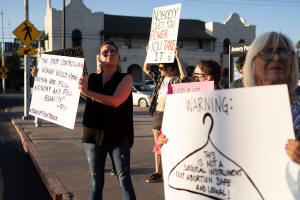Providers can sue over Arizona ban on abortion for genetic anomalies
-court
 Send a link to a friend
Send a link to a friend
 [October 31, 2023]
By Brendan Pierson [October 31, 2023]
By Brendan Pierson
(Reuters) -A U.S. appeals court on Monday revived a challenge to an
Arizona law banning abortions from being performed solely because the
fetus has a genetic abnormality.
A three-judge panel of the 9th U.S. Circuit Court of Appeals unanimously
ruled that a group of healthcare providers can sue the state over the
law because they are harmed by it, reversing a lower court ruling.
The panel did not address the merits of the challenge, finding only that
the providers are entitled to pursue it in court.
Arizona Attorney General Kris Mayes, a Democrat elected in 2022,
declined to defend the 2021 law in court and has said she would not
enforce it. It is instead being defended by Arizona Senate President
Warren Petersen and Arizona House of Representatives Speaker Ben Toma,
both Republicans.
The challenged law, signed by Republican then-Governor Doug Doucey,
makes it a crime punishable by prison to perform an abortion solely
because a fetus is detected to have a genetic abnormality, like Down
syndrome or cystic fibrosis, unless the abnormality is fatal. Supporters
of such laws describe them as safeguards against eugenics.

"We are glad that the Ninth Circuit has recognized that we deserve to
have our day in court," Jessica Slarsky of the Center for Reproductive
Rights, a lawyer for the plaintiffs, said in a statement. "We will
continue fighting to ensure Arizonans have access to essential abortion
care."
"Children diagnosed with Down syndrome and other conditions have the
same right to live as everyone else," Erin Hawley of Alliance Defending
Freedom (ADF), which represents the Republican lawmakers, said in a
statement. "We look forward to continuing to defend this commonsense
principle in court. "
[to top of second column]
|

Abortion rights protesters march through downtown Tucson in part
with nationwide demonstrations following the leaked Supreme Court
opinion suggesting the possibility of overturning the Roe v. Wade
abortion rights decision, in Tucson, Arizona, U.S., May 14, 2022.
REUTERS/Rebecca Noble/File Photo
 ADF is a conservative legal group
that has led other anti-abortion cases, including an attempt to ban
the abortion pill mifepristone.
U.S. District Judge Douglas Rayes blocked the law in September 2021,
finding it burdened women's right to abortion guaranteed by the U.S.
Supreme Court's landmark 1973 Roe v. Wade ruling. However, the U.S.
Supreme Court ordered him to reconsider last year after it
overturned Roe.
The providers - including two individual doctors and medical
associations - said the law was so vague they did not know when it
applied. They said they were "over-complying" by not performing any
abortion when there was a genetic condition, because they could not
know whether the condition was covered by the law or whether it was
the mother's sole reason for wanting an abortion.
Rayes in January rejected that argument, saying the providers had
not been harmed by not performing abortions. But the 9th Circuit
panel found that the economic loss of not performing abortions that
they otherwise would perform was enough to go forward with the
lawsuit.
(Reporting By Brendan Pierson in New York; Editing by Alexia
Garamfalvi and Jonathan Oatis)
[© 2023 Thomson Reuters. All rights
reserved.]This material may not be published,
broadcast, rewritten or redistributed.
Thompson Reuters is solely responsible for this content.
 |